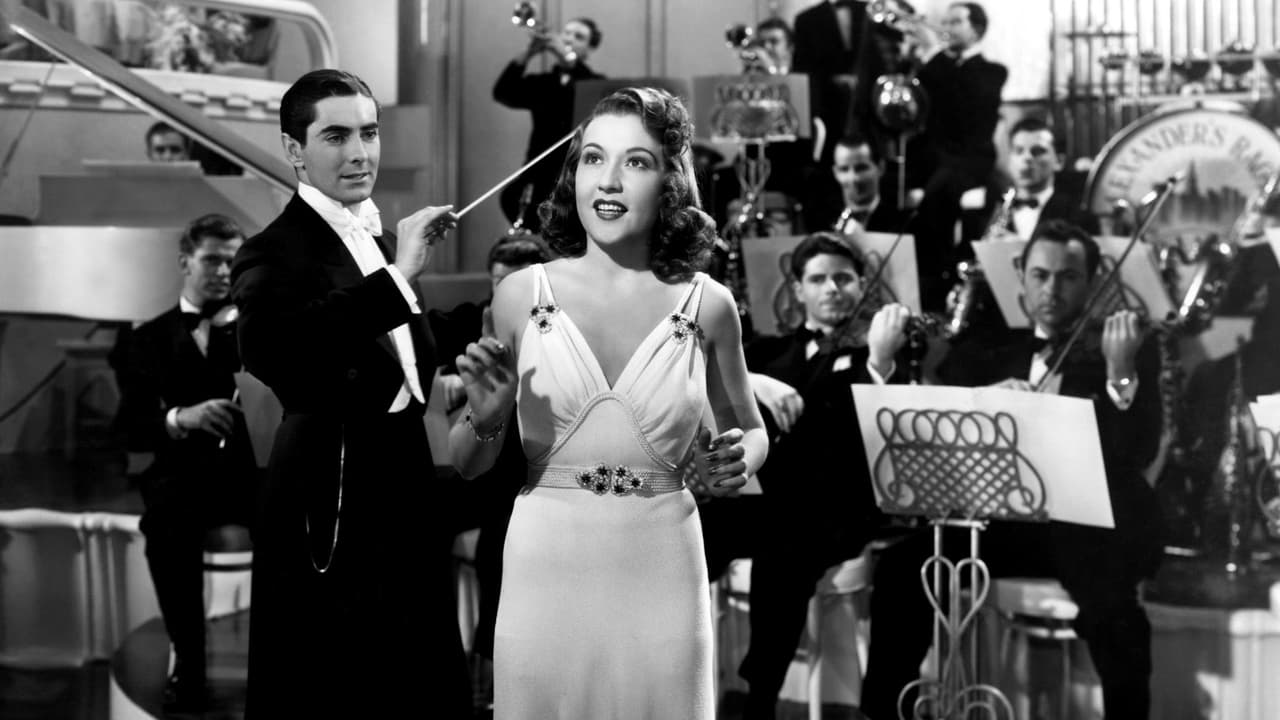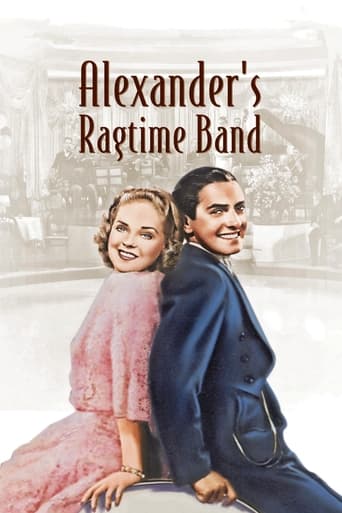

This is an extremely fun musical romantic comedy-drama which features the songs of Irving Berlin and stars Don Ameche (one of my absolute favourite actors), Tyrone Power and Alice Faye, three of Fox's biggest stars of the day. The screenplay was co-written by Berlin himself and features some of his best songs such as "Heat Wave", "Easter Parade" and "Blue Skies" (my personal favourite of those featured). It has a great supporting cast including future Tin Man Jack Haley, Ethel Merman, Jean Hersholt and Ruth Terry (who is still alive) as well as brief appearances by future horror icons Lon Chaney, Jr. as a photographer and John Carradine as the most unintentionally creepy taxi driver in film history.The film tells the story of a privileged young man named Roger Grant (played by Power), who takes the stage name Alexander and eventually becomes a bigwig on the swing scene, and his relationship with the initially unsophisticated "platinum loudmouth" Stella Kirby (played by Faye). After months of fighting, they realise that they love each other and become a couple but break up when Stella chooses to go to Broadway without Alexander and his band. After going to and returning from World War I, Alexander realises that he has been unfair to her and wants to get back together, only to find that she is married to his best friend Charlie Dwyer (played by Ameche, who gives the best performance in the film). However, everything turns out perfectly fine in the end and there is a happy ending of a kind that only Classic Hollywood could deliver! The second half of the film is far stronger than the first but it's a great feel good film. They don't make them like this anymore, I'm afraid. It's the kind of film that my grandmother loved.
... View MoreHow sad ....wonderful songs that make you whistle or sing them time after time..as compared to today's garbage. All the accolades mentioned in other reviews were right on, the music, the stars at their pinnacle success. Aside from that, no one mentioned the one skit that really impressed me was the one that Wally Vernon and Dixie Dumbar did...wonderfully performed...It was one of the highlights for me. I could buy the DVD just for that one skit.The scene where Tyrone is insulting Alice with her Plantinium hair wig, must have been a ' dig' at the rage Jean Harlow caused when M-G-M created it for her and the 'penciled' eyebrows.
... View MoreFor viewers who like Irving Berlin music, this is a film to watch. His songs are really the main attraction. But the story, which encompasses a group of musicians and their career changes, has an interesting series of romantic plot twists that is intriguing.The main character is Roger (Tyrone Power), a man who starts his career in a highbrow musical setting, but changes to more popular ragtime. The story is fictional, but Roger's character arc is inspired by the life of Irving Berlin.A big-budget film that was in production for almost two years, "Alexander's Ragtime Band" received a huge promotional build-up in 1938. And it was well received by audiences. Sets are lavish. B&W cinematography is competent. Casting and acting are acceptable overall. However, Tyrone Power is the only major actor who lacks musical talent, and it shows. Both Don Ameche and Jack Haley add luster. Alice Faye is adequate.The film is less constricted by plot than other musicals. But there's still a lot of dialogue. And, except for the title song and a quick version of "Easter Parade", the music is somewhat bland and uninteresting. I would have preferred more evocative music. The film's tone ranges from semi-bawdy to mushy romanticism.This is a large-scale, Americana period piece film, with an accent on the music of Irving Berlin. It is old fashioned, both in plot and in style. It's technically well made. But to me it's too removed in time from current culture to be anything other than historically quaint.
... View MoreI wouldn't want to put money on it, but I'm willing to say there must be at least 25 Irving Berlin songs in Alexander's Ragtime Band. This was the first of those Irving Berlin extravaganzas where a history of an era was told with his music, the others being Blue Skies and There's No Business Like Show Business. After what happened to his score in Reaching for the Moon, Berlin demanded and got complete control in every film that he wrote or supplied the music for. And you will not hear one note of any other composer's music. Just listen to the background music and you'll see what I'm talking about.The song Alexander's Ragtime Band is considered Berlin's first big popular hit and so a story was constructed around a group of itinerant musicians who when they hire girl singer Alice Faye make a huge hit with the selfsame Alexander's Ragtime Band. So the film is about the lives and loves of Faye, Tyrone Power, Don Ameche, Ethel Merman, Jack Haley, etc. for an over quarter of a century. Except for Power, all these other folks are real talented musically and they contribute vocally with a lot of Irving Berlin old favorites. And Alice Faye and Don Ameche both sang a new tune Berlin wrote for this film, Now It Can Be Told. Faye's version is especially grand, one of her best movie songs.Tyrone Power one of the finest of leading men in old Hollywood was unfortunately not blessed with a singing voice. Just hear him on a few bars of another Irving Berlin song in Second Fiddle and you'll see what I mean. He leads the band and it looks a bit ridiculous for him to be doing that and watching the others perform.This film is the reason I've been long convinced that Darryl F. Zanuck hired John Payne, an actor who looked somewhat like Power and could contribute musically in films with Faye, Betty Grable and the rest of Fox female musical ladies.Of course anyone who really loves Irving Berlin's music will watch this film and won't quibble about Tyrone Power not singing.
... View More